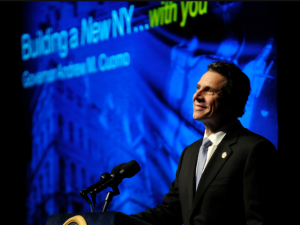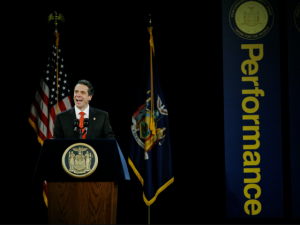Caitlin Thompson appears in the following:
Giuliani Endorses Turner in Senate Race
Wednesday, May 23, 2012
Former Mayor Rudy Giuliani is endorsing Rep. Bob Turner, the surprise victor in the special election to replace disgraced Rep. Anthony Weiner, in his candidacy for the Senate.
Cuomo touts infrastructure bank in budget deal
Wednesday, March 28, 2012
As he previewed in his January State of the State address, Governor Andrew Cuomo got his infrastructure bank this week after finalizing the state budget earlier this week.
The "New York Works" plan would use $232 million in capital funds and $917 million in new federal funds for a total of $1.2 billion in new spending. That funding would, in turn, leverage private resources to inject $15 billion into infrastructure spending.
According to Transporation Nation's Andrea Bernstein:
In the past year, infrastructure spending has gone out of of favor, particularly among Republicans. Governors Chris Christie in New Jersey, Scott Walker in Wisconsin, and Rick Scott in Florida all killed big rail projects, and Republicans in Congress have balked at passing a surface transportation bill, which runs out at the end of this month.
So it’s notable that Governor Cuomo sees infrastructure spending as part of his ticket to electoral success. His email describes New York Works “as a new and smarter strategy for putting New Yorkers back to work by rebuilding our aging infrastructure and helping put our state’s economy back on track.”
Chat Recap: Supreme Court on Healthcare
Tuesday, March 27, 2012
This afternoon at 2, Anna Sale and Brian Lehrer hosted a live chat on the Supreme Court hearings. They were joined by The Takeaway host Celeste Headlee, health care reporter Fred Mogul and others to parse out what’s at stake. Read a recap of the live chat below.
Senate, Assembly Adopt One House Budgets
Monday, March 12, 2012
By Karen DeWitt, New York State Public Radio Capital Bureau Chief
The state Assembly and Senate have released one house versions of a state budget that do not include Governor Andrew Cuomo’s plan for a new benefit tier to limit the pensions of future public workers.
The budgets plans are designed to stake out the positions of Assembly Democrats and Senate Republicans - and are often changed in the final deal with the governor.
Neither house has included Cuomo’s plan to offer a new Tier 6 benefit package with smaller pensions for new workers. Senate Finance Committee Chair John DeFrancisco, debating on the Senate floor, said the pension changes are still under discussion with the governor. He added Cuomo has offered a new option, and Senators are deciding if it’s “is something that we should support.”
Governor Cuomo has said he won’t accept any spending plan from the legislature that does not include a new pension tier for future state workers. The governor said if there’s no agreement, he’ll try to force lawmakers to adopt his plan by presenting it in the first budget extender, then daring the legislature to accept it or shut down the government.
'The Capitol Pressroom' with Susan Arbetter
Thursday, March 01, 2012
 Today on "The Capitol Pressroom":
Today on "The Capitol Pressroom":
For show archives, please visit The Capitol Bureau's website here.
Cuomo Ready to Step in With Teacher Evaluation Plan
Monday, February 13, 2012
By WNYC's Yasmeen Khan
Governor Cuomo says he's working on his own version of an evaluation system for teachers and principals in the event that the state and its largest teachers’ union cannot work out a deal by Thursday, the deadline for submitting amendments to his budget proposal. He said he would impose his own evaluation plan in an amendment to the budget, which ties state aid to schools to the "implementation of an enhanced teacher evaluation process."
Cuomo spoke about the idea to Susan Arbetter on WCNY's program, "The Capitol Pressroom." He did not give specifics about what his plan would look like, but he did say it would include ideas outlined in a letter to the Board of Regents in May 2011.
The governor also said he would make an effort to streamline the existing law outlining teacher evaluations.
"It's a very complicated law right now--what's done by the local districts, what's done by the state education department, how many different criteria are there for evaluation," he said.
The governor does support tying student performance on standardized tests to teacher evaluations. That issue has been a sticking point in negotiations between the New York State United Teachers union and the education department.
More than 1,300 principals across New York have also signed a letter objecting to the use of student test scores in the new evaluation system, saying regulations developed by the state give undue weight to student performance on those tests.
New York state also agreed to implement a new teacher evaluation system in order to receive $700 million in federal Race to the Top funds.
New Yorkers: A Pay Raise for Politicians? No Way.
Monday, February 06, 2012
By Karen DeWitt, New York State Public Radio Capital Bureau Chief
Some lawmakers, including Assembly Speaker Sheldon Silver, have been saying recently that lawmakers “deserve” a pay raise and have suggested setting up a commission to explore the issue.
But, a new poll by Siena College finds that voters are opposed to the idea by a two to one margin, with 67% opposed and 31% in support. Siena’s Steve Greenberg says those surveyed like the idea of a pay hike for the governor and his top commissioners even less, with 74% against and 25% in favor.
“Voters are even more opposed to an increase in the pay of the governor,” said Greenberg. “Or an increase for commissioners of state agencies.”
Governor Cuomo has said he’s having trouble attracting top level commissioners because of the current pay strictures, though the governor also says now is not the time for raises.
There has not been a pay increase for lawmakers, the governor or state commissioners since 1999.
The poll found the governor continues to be very popular with New Yorkers, 74% view him favorably, his highest rating ever.
Fracking Opponents Rally at the Capitol
Monday, January 23, 2012
By Karen DeWitt, New York State Public Radio Capital Bureau Chief
Actor Debra Winger and "Gasland" filmmaker Josh Fox were among hundreds of anti-fracking protesters who descended upon the State Capitol Monday, in one of the largest demonstrations against the natural gas drilling process so far.
Cuomo Says 'No' to Fingerprinting for Food Stamps
Friday, January 20, 2012
By Karen DeWitt, New York State Public Radio Capital Bureau Chief
Republican Presidential candidate Newt Gingrich intends it as an insult when he calls President Barack Obama, the “food stamp President.” Governor Andrew Cuomo seems not to fear being called the food stamp governor — he’s proposing ways more New Yorkers in need can access the federal program.
Governor Cuomo, in his State of the State speech, said he wants to end what he calls the “stigma” of requiring that New Yorkers who need food stamps be fingerprinted before becoming eligible for benefits.
Analysis | In Budget Address, Cuomo Positions Himself as Education Governor
Wednesday, January 18, 2012
By Joyce Purnick/WNYC Political Analyst
Last year, Governor Andrew Cuomo took some heat from education reformers for failing to put his weight behind changing the way teachers are dismissed. Traditionally, if public school teachers have to be laid off, those with the least seniority – usually the youngest and theoretically the most innovative – go first, ahead of those with seniority.
Mayor Michael Bloomberg pushed hard to change what is known as LIFO (last in, first our), but he needed Cuomo to back him up. But the governor, in his first year in Albany, had other priorities.
Now, Cuomo is trying to make up for lost opportunities. In his State of the State address earlier this month, and in his budget Tuesday, he emphasized education reform, especially tougher teacher evaluations. There is a legitimate question about the likely impact of more rigorous teacher evaluations, but many reformers consider it to be the latest cure-all for what ails the public schools, and Bloomberg and now Cuomo are pushing hard for change.
Breaking Down Cuomo's Budget Plan
Tuesday, January 17, 2012
By the WNYC Newsroom
New York Governor Andrew Cuomo proposed a mostly flat $132 billion budget on Tuesday that has no tax increases, more education and health care aid and a radical change in pensions for new public employees.
Cuomo said his second annual budget that he will present to lawmakers includes about a 2 percent decrease in state spending, although total spending, including federal funds linked to state spending, will be mostly flat.
“Compared to what we went through last year, this is incredibly manageable, this budget,” Cuomo said.
Here's what we know:
Business and Economy
- Casino & Convention Center: The governor is asking state lawmakers to pass enabling legislation to allow the “disposal” of properties adjacent to the Jacob K. Javits Convention Center on Manhattan’s West Side. The budget plan also touts the proposal to build a new convention center at Aqueduct Racetrack, which Cuomo says would require no public funding. The word “casino” is never mentioned in the budget book.
- Tax Reform: Cuomo’s recent decision to lower taxes on most middle-class New Yorkers while raising rates for the highest-earners will result in an additional $1.5 billion in revenues for the state. Middle-income individuals and businesses will save $900 million they would have sent to Albany.
- Mandate Relief: State law imposes pension and healthcare costs (“mandates”) on local governments across the state, including New York City’s. Since the passage of a property tax cap last year, local governments have struggled to pay these uncontrollable expenses. Cuomo is proposing to reduce the spending obligations of local governments by introducing a new pension class (Tier VI) with fewer benefits, more state funding for medicaid, and a variety of “efficiency” measures. In total, these measures are projected to save local governments $942 million. New York City would save $30 billion over three decades as a result of Tier VI.
- Labor: Cuomo wants to wring new cost savings from upcoming negotiations with state worker labor unions. “Absent new agreements, layoffs may be necessary” according to the budget proposal. Tier VI would help local governments reduce their employee benefits costs.
- The Environment: The Department of Environmental Conservation, a key regulator of industrial activities in New York City, would see its budget reduced by $167.7 million (16 percent), primarily because of expiring federal stimulus funds. However, the DEC would also receive an additional $102 million in state funds for anti-flooding projects. There is no mention of expected revenues from natural gas drilling, once the DEC begins issuing permits for hydraulic fracturing, a natural gas drilling technique which is currently under review.
- Consolidating Agencies and Entities:The Division of the Lottery would merge with the Racing and Wagering Board. The Department of Civil Service and the Governor’s Office of Employee Relations would join into a single office. The Department of Transportation would lose five regional offices (leaving six remaining). The DEC would pass control of the Bellayre ski resort in the Catskill Mountains to the Olympic Regional Development Authority, an entity created to manage facilities for the 1980 Lake Placid Olympics. And more than 25 boards and commissions deemed to be moribund or redundant would be eliminated. Taken together, all these measures and more would save taxpayers $10 million.
Education
- Teacher Evaluation System: The governor announced that the state Education Department and school employee unions will have 30 days to agree on a new effective teacher evaluation system or the governor will propose an evaluation system in the 30-day budget amendments. Schools will be given one year to implement the system or risk forfeiting an increase in education aid in the 2012-13 and 2013-14 school budgets.
- The city would get an additional $243 million next year in additional education aid. Cuomo is recommending an additional $20 billion in school aid for the next fiscal year, an increase of 4 percent. But there's a catch.
School districts will not be eligible for aid increases unless they have fully implemented the new teacher evaluation process by January 17, 2013. Local districts and their unions are supposed to negotiate new teacher evaluations this year in order to receive federal aid from the state's $700 million Race to the Top grant.
But the state teachers union filed a lawsuit, claiming the evaluation structure puts too much emphasis on student test scores. New York City and its teachers union also hit an impasse when the union demanded changes to the arbitration system in cases where teachers get poor ratings from their principals.
This failure to reach an agreement already cost the city $58 million in federal aid for 33 struggling schools.
Assuming districts do reach deals with their unions to qualify for the additional aid, the governor would allocate $290 million in general support for high need school districts (including New York City), as well as those that were most affected by reductions last year.
High-need school districts will receive 76 percent of the 2012-13 allocated increase and 69 percent of total school aid. Another $265 million was allocated for increased reimbursement in expense-based aid programs (construction, pupil transportation) and other miscellaneous aid categories. And $250 million will be used for performance grants.
The governor's budget also proposes to reform the disciplinary process for teachers who get bad ratings. Citing figures showing the arbitration process lasts an average of 653 days, it says there's little incentive for districts and unions to resolve their disputes in a timely manner because the state pays for the hearings.
The governor is proposing to allow the State Education Department to set "reasonable limits on the costs of teacher disciplinary hearings," and to disqualify hearing officers who fail to comply with their deadlines. Under a new payment structure, the cost of the teacher hearings would be shared by school districts and unions, or the employees if they aren't represented by unions.
The budget proposal also recommends improving the cost-effectiveness of school transportation by centralizing the purchase of school buses through a single state contract developed with advice from the districts. State and districts would benefit by combining their purchasing power.
Heathcare
Medicaid, the state’s second largest expense (behind education), is administered by Albany, but the cost is shared among federal, state and county governments. Counties have little control over the program; they more or less just get a bill they have to pay. Starting this year, the state will increasingly shoulder the counties’ share of Medicaid costs and administrative responsibilities, a move it says, “will result in greater efficiencies” and “save counties and New York City $1.2 billion over five years.”
Medicaid spending will increase once again, but as with last year, Cuomo is dramatically decelerating the rate of growth over years past.
“State Medicaid spending had been projected to grow at an unsustainable rate of 13 percent for the 2011-12 fiscal year,” his budget briefing book reads. “And now future growth will be limited to the 10-year rolling average of the Medical Consumer Price Index, currently 4 percent.”
Cuomo says he’ll limit payments to non to non-profit and for-profit agencies, which the state contracts for a wide array of services -- especially in healthcare, mental health and various social safety net programs. It’s not clear exactly how it would work, but his budget says that starting this year, “at least 85 percent of every public dollar will be spent on direct services, not administration, reimbursement for any executive’s compensation will be capped at $199,000, and excess compensation will be a basis for rejection of a provider.”
Transportation
Cuomo is proposing the MTA get $251 million more from the general fund than it did last year. That's somewhat less than the $310 million the MTA will lose as a result of the MTA payroll tax cut, although the state argued in a conference call with transit activists Tuesday that that's actually not less than the MTA needs because the state's budget starts three months earlier than the MTA budget.
Confusingly, in the text accompanying the budget numbers, the state says it will give $190 million more to the MTA than it did, which "includes $250 million to the MTA."
We’re waiting for an explanation on that one to from the governor's office.
There's also $770 million for capital construction aid (as the MTA has outlined in its capital plan.)
The governor is also proposing $1.16 billion to start off his "New York Works" infrastructure bank for "bridges, roads, and major infrastructure projects," with most of that money ($917 million) coming from the federal government.
The budget also includes $9.7 million to improve Amtrak rail service.
And if you live in Broad Channel or the Rockaways, Queens, the state will reimburse you for your tolls, if Cuomo has his way.
Millionaire's Tax
The budget is built around spending about $2 billion from the "millionaire tax" increase on New York's top earners adopted in December. That pays for a $200 to $400 income tax break for most middle-class families, addresses a $2 billion deficit, and helps pay for 4 percent increases for public schools and hospitals and health care facilities through the Medicaid health care system.
Those increases total $1.4 billion.
Pension Plan
Cuomo is trying to balance continued hard fiscal times in a sluggish recovery with plans to invest in New York's future and attract jobs through tax breaks and other enticements. He also wants to cut long-term spending, including what he's called unsustainable public pension costs.
Cuomo's proposed pension changes would save governments outside New York City $83 billion over 30 years, while saving New York City $30 billion. The new less lucrative pension would be applied to new hires, not current employees or retirees.
Bloomberg Praises Cuomo's Budget
In a written statement, Mayor Michael Bloomberg called Cuomo's plan a "bold commitment" to tackle some of the toughest budget challenges facing the state.
Bloomberg and Cuomo have had differences of opinion in the past when it comes to how money is allocated to the city from the state. But the mayor says pushing for pension and juvenile justice reform, as well as continuing to insist on statewide teacher evaluations are the right priorities.
Child advocates also praised the governor for continuing to shrink the state's juvenile justice system.
According to the state budget, 324 beds will be removed from the system over the next few years and New York City youth residing in upstate facilities with the lowest levels of security will be transferred to programs closer to home.
Legislation must still be passed in order for facilities to be closed.
With reporting by Andrea Bernstein, Beth Fertig, Kathleen Horan, Ilya Marritz, Fred Mogul and Cindy Rodriguez
Analysis | Bloomberg Fights for the Basics in Address
Thursday, January 12, 2012
By Joyce Purnick/WNYC Political Analyst
Mayor Michael Bloomberg stayed true to form in his 11th – and penultimate – State of the City address. With his legacy no doubt on his mind, he returned to the basics, to the issue that topped his to-do list when he took office – education reform – and all but declared war on the teachers union.
He said more firmly than ever that he wants merit pay and tougher evaluation of teachers, and declared he will move ahead with rigorous teacher assessments in 33 low-performing schools, where negotiations with the United Federation of Teachers collapsed once already. The mayor also plans to open new charter schools.
Of all of the mayor's ideas only one – helping highy qualified new teachers with their student loans – met with tentative approval from the United Federation of Teachers president, Michael Mulgrew.
Mayor to Revive Kingsbridge Armory Project
Wednesday, January 11, 2012
Mayor Michael Bloomberg will once again try to get the 575,000-square-foot former National Guard armory in the Kingsbridge Section of the Bronx redeveloped, according to a city hall spokesman. The mayor will mention the initiative in the State of the City address Thursday.
In 2009, Bloomberg rejected a proposal for a shopping mall by the Related Companies because the City Council would have required all the jobs there to pay a "living wage" of $10 an hour plus benefits. Read more about the project from WNYC's Matthew Schuerman.
The Capital Pressroom with Susan Arbetter
Thursday, January 05, 2012
 Today on "The Capitol Pressroom":
Today on "The Capitol Pressroom":
What does upstate think of the Governor’s State of the State Address? We’ll hear from 3 city leaders: Buffalo Mayor Byron Brown, Syracuse Mayor Stephanie Miner, and Binghamton Mayor Matt Ryan.
Chairman of the Senate Energy Committee George Maziarz
joins us with his reaction to the Governor's proposed energy highway to bring power from upstate to NYC.
The Governor laid out very clearly his intention to propose a tier 6 for state workers. We speak with PEF President Kenneth Brynien about the plan.
Assembly Minority Leader Brian Kolb joins us with his thoughts on the Governor’s speech.
And Senator Andrew Stewart-Cousins will be here with reaction from the Senate Minority conference, as well as a list of the minority’s top priorities for the coming session.
Watch and Chat Live: State of the State Address
Wednesday, January 04, 2012
Join us at 1:15 pm to watch and live chat the New York State of the State Address. We'll hear from WNYC's political team, including WNYC Managing Editor Karen Frillman, Host Brian Lehrer, WNYC reporter Bob Hennelly, Contributing Editor for Education Beth Fertig and more...
Subscribe to It's A Free Country: The Podcast
Friday, December 30, 2011
Brian Lehrer and Caitlin Thompson welcome you to the podcast -- launching on January 11th.
New Details on Fracking Policy
Thursday, December 29, 2011
By Karen DeWitt, New York Public Radio Capital Bureau Chief
One of the biggest and most controversial issues facing New York in the New Year is hydrofracking. Governor Cuomo’s environmental department is conducting a review process and is likely to begin issuing permits sometime in 2012.
Earlier in the year, it seemed that the Cuomo administration was on a fast track to allow hydrofracking in New York. In June, state environmental officials proposed allowing the gas drilling process on some private lands in the state. They began a review process that was to have been completed by the end of 2011. But they added four public hearings and extended the public comment period until January 11th.
Environmental Commissioner Joe Martens said that after the review process ends, he and his staff will have to sift through at least 16,000 new comments.
“It will take months to do it properly,” Martens said.
The Department of Environmental Conservation had hoped to complete a tax and fee structure for drilling in time to be included in the governor’s budget proposal in mid January.
Those decisions were to have been made by an advisory panel representing the industry, environmentalists and the legislature. But the panel failed to come up with a tax and fee plan in time, and those discussions will continue into the New Year.
Without the fee structure in place, the D.E.C won’t have the resources to hire staff to issue the permits or make sure that the gas drillers comply with all the new regulations that will eventually be in place. Currently, the department has just 16 employees who are involved in energy well drilling. Commissioner Martens said the current capacity to review any new applications for drilling is “very limited to non-existent”.
It’s estimated that 100 to 200 new regulators and permitting experts would be needed to oversee the expected new drilling activity.
Martens for the first time in late December suggested that permitting may begin very slowly and possibly be phased in over time.
“People have suggested looking at specific geographic areas, phasing in the process,” Martens said. “We’re looking at all of that.”
Governor Cuomo has not weighed in with any opinions about hydrofracking, preferring to let his environmental commissioner take the lead for now. The governor in the fall said he was still keeping an open mind.
“Let’s not respond emotionally,” Cuomo said in October. “Let’s get the facts.”
Rob Moore, with Environmental Advocates and a member of the fracking advisory panel, said he is relieved that state officials seem to be taking a more considered approach recently, and he hopes that continues.
“I think the state should be very cautious about trying to drill in 2012,” Moore said.
Moore says a number of uncertainties and questions remain, including the economic impact of the industrialization that comes with gas drilling on remote rural areas, and what Moore says is the uncertain profitability of the drilling companies, now that gas prices have plummeted. The environmental group would also like more data on potential health impacts of drilling and potential contamination of drinking water.
The lobby group for the gas companies, Independent Oil and Gas Association, has spent recent months trying to build community support, holding public forums in communities where fracking may take place. Spokeswoman Cherie Messore admitted that fracking has become a negative “buzz word”, and said the group’s goal is to lessen fears about hydrofracking and help the public be more informed.
“There is a great deal of misinformation,” Messore said.
She said fracking is safe, when all of the environmental rules are followed, and many of the companies interested in drilling already have good track records in New York.
Steve Greenberg, a political analyst with the Siena Research Institute, said fracking presents a “potential landmine” for Governor Cuomo whether the state ultimately allows or bans the gas drilling.
Greenberg said the governor risks alienating either environmental groups or the powerful gas industry and faces a “lose-lose” situation.
Polls show the public is evenly divided about whether fracking is a good idea for the state’s economic future.
Occupy Albany Cleared from Lafayette Park
Friday, December 23, 2011
By Karen Dewitt, New York Public Radio Capital Bureau Chief
The dismantling of one of the last Occupy encampments in New York ended with pepper spray and arrests on Thursday, as Albany city workers moved in and took down tents at the Occupy Albany encampment.
Occupy Albany’s camping permit expired at 7:00 a.m. Thursday, and by mid afternoon city workers moved in and began dismantling the tents. When workers tried to take down the last tent, protesters seized it and began marching up and down the city streets in the midst of the evening rush hour. They chanted “Occupy Albany all day, all week”, and “Banks got bailed out, we got sold out”.
The protest took on a carnival atmosphere, but things turned darker when the demonstrators returned to the city park. Police attempted to take the tent away, a scuffle ensued, and four were arrested. A local news cameraman was apparently assaulted in the ruckus.
“The police came, they started knocking everybody away, they were forcefully grabbing us, bringing people to the ground, ” said Shana Goldman, who was among the protesters who said they were pepper sprayed.
“Some had to be taken to the hospital,” she said.
By early evening last night, some protesters lingered, but the park was clear of any tents.
‘The Capitol Pressroom’ with Susan Arbetter
Friday, December 23, 2011
 Today on "The Capitol Pressroom":
Today on "The Capitol Pressroom":
It's our "Annual Revolving-Door Reporter Year-end Assessment and Moment of Sharing!"
This year the reporters visiting the Plywood Hut include Ken Lovett of the NY Daily News! Rick Karlin of the Albany Times Union! Betty Flood of the Cuyler News Service! Yancey Roy of Newsday! And Michael Gormley of the AP! But who knows who may swing by! Perhaps some Surprise Musical Guests?
It's the ONLY non-exclusive Co-Ed Fully Clothed Political Year End Assessment to take place in the Plywood Hut on the 3rd Floor of the State Capitol in Albany on this date as far as I know!
Kruger: Another Conviction, Another Pensioner?
Thursday, December 22, 2011
By Yasmeen Khan
Despite pleading guilty to four federal corruption charges this week, state Senator Carl Kruger will still be entitled to his state pension. And with more than 36 years of service credit working for New York, Kruger, if he submits an application to be an official state retiree, could earn about $70,000 per year (the state comptroller's office does not have an estimate for Kruger's annual pension, but check out the calculation by Jimmy Vielkind on his Capitol Confidential blog for The Albany Times Union).
In fact, for decades, any elected state official convicted of a crime has been able to collect his or her pension. They're entitled to it under the New York State Constitution. There's a new law on the books to change that (more on that in a minute), but the law doesn't apply to state employees already working before the law was passed.




